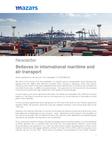
Believes in international maritime and air transport
We refer to the income from the exploitation of maritime and air transportation that Colombia has signed since the 1960's with different countries (USA, Germany, Argentina, Chile, Italy, Brazil, Panama) and in which it has been established that these activities (air or maritime) are exempt from any direct income tax, in addition to property taxes. As a general rule, this income will only be taxed in the country to which the flag (residence) of the vessel or aircraft belongs.
In some cases, such as the agreement with Chile, the effects are extended to the fulfillment of formal duties (i.e., the filing of income tax returns is not required, e.g., but the delivery of information for third party cross-checking).
In time, all these agreements were signed prior to 2012 (the most recent is the Panama agreement signed in 2008), the period in which the Cree was created. Therefore, none of their texts refer to this "new" tax.
However, the meaning "direct tax on income" covers both the ordinary income tax and the Cree, since both determine a disposable income (income - costs - deductions) as the basis for the liquidation of the amount to be paid, with the difference that in the second (Cree) deductions considered special (donations, tax benefits, among others) are not allowed.
Thus, and as the intention of these international treaties was to avoid the taxation of income obtained by these activities (air or maritime) with any direct tax, this supranational intention could not be circumvented by the imposition of a "new" tax that involves similar characteristics to those of the ordinary income tax (this aspect ratified by Article 15 of Law 1739 of 2014) with the issuance of an ordinary law as it is the 1607. These same conclusions must proceed for the Double Taxation Avoidance Agreements of general content (dealing with various types of income) that Colombia has signed since 2008, as far as air and maritime transportation income is concerned.
For all the above, and in order to provide legal certainty in this kind of international operations, it is necessary that the tax authorities make a pronouncement (they can do it in the same form that is considered an administrative act) to indicate that the income obtained by foreign transport companies (whose country of flag or residence is one of those with which Colombia has signed international treaties) are NOT taxed with Creer.
Finally, it should be clarified that international transportation companies whose country of residence has not signed agreements to avoid double taxation with Colombia, must determine their net income following the rules provided in Article 203 of the Tax Statute.


